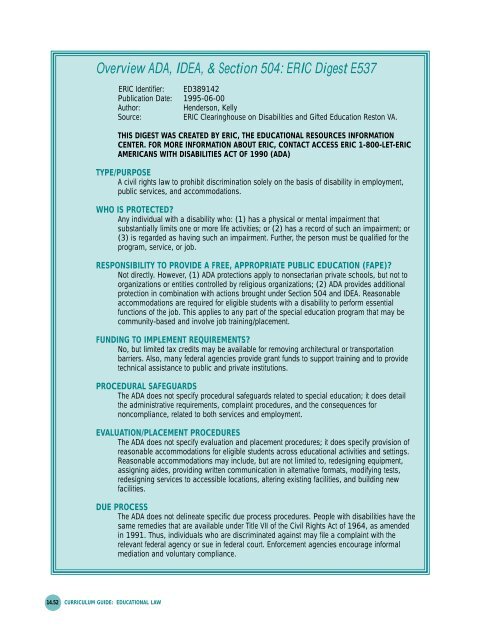Educational
Educational Law - Washington State Center of Excellence for ...
Educational Law - Washington State Center of Excellence for ...
- No tags were found...
You also want an ePaper? Increase the reach of your titles
YUMPU automatically turns print PDFs into web optimized ePapers that Google loves.
Overview ADA, IDEA, & Section 504: ERIC Digest E537ERIC Identifier: ED389142Publication Date: 1995-06-00Author:Henderson, KellySource:ERIC Clearinghouse on Disabilities and Gifted Education Reston VA.THIS DIGEST WAS CREATED BY ERIC, THE EDUCATIONAL RESOURCES INFORMATIONCENTER. FOR MORE INFORMATION ABOUT ERIC, CONTACT ACCESS ERIC 1-800-LET-ERICAMERICANS WITH DISABILITIES ACT OF 1990 (ADA)TYPE/PURPOSEA civil rights law to prohibit discrimination solely on the basis of disability in employment,public services, and accommodations.WHO IS PROTECTED?Any individual with a disability who: (1) has a physical or mental impairment thatsubstantially limits one or more life activities; or (2) has a record of such an impairment; or(3) is regarded as having such an impairment. Further, the person must be qualified for theprogram, service, or job.RESPONSIBILITY TO PROVIDE A FREE, APPROPRIATE PUBLIC EDUCATION (FAPE)?Not directly. However, (1) ADA protections apply to nonsectarian private schools, but not toorganizations or entities controlled by religious organizations; (2) ADA provides additionalprotection in combination with actions brought under Section 504 and IDEA. Reasonableaccommodations are required for eligible students with a disability to perform essentialfunctions of the job. This applies to any part of the special education program that may becommunity-based and involve job training/placement.FUNDING TO IMPLEMENT REQUIREMENTS?No, but limited tax credits may be available for removing architectural or transportationbarriers. Also, many federal agencies provide grant funds to support training and to providetechnical assistance to public and private institutions.PROCEDURAL SAFEGUARDSThe ADA does not specify procedural safeguards related to special education; it does detailthe administrative requirements, complaint procedures, and the consequences fornoncompliance, related to both services and employment.EVALUATION/PLACEMENT PROCEDURESThe ADA does not specify evaluation and placement procedures; it does specify provision ofreasonable accommodations for eligible students across educational activities and settings.Reasonable accommodations may include, but are not limited to, redesigning equipment,assigning aides, providing written communication in alternative formats, modifying tests,redesigning services to accessible locations, altering existing facilities, and building newfacilities.DUE PROCESSThe ADA does not delineate specific due process procedures. People with disabilities have thesame remedies that are available under Title VII of the Civil Rights Act of 1964, as amendedin 1991. Thus, individuals who are discriminated against may file a complaint with therelevant federal agency or sue in federal court. Enforcement agencies encourage informalmediation and voluntary compliance.14.52CURRICULUM GUIDE: EDUCATIONAL LAW




